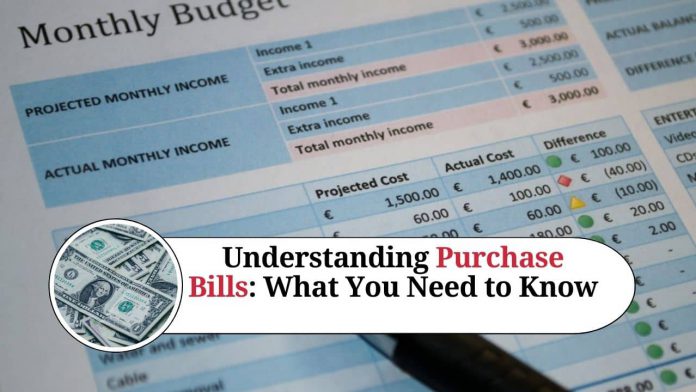A purchase bill is a crucial document that is used to record the details of a transaction when goods or services are purchased. It serves as evidence of purchase and is used for accounting and taxation purposes. Understanding what a purchase bill is and why it is important can help you manage your finances and avoid potential problems.
What is a Purchase Bill?
A purchase bill is a document that is used to record the details of a purchase transaction. It typically includes information such as the name of the seller, the date of the transaction, the quantity and price of the items purchased, and the total amount paid. A purchase bill can be in the form of a paper document or an electronic invoice.
Why is a Purchase Bill Important?
A purchase bill is important for several reasons. First, it serves as evidence of a transaction, which can be helpful in case of a dispute between the buyer and the seller. It can also be used as proof of purchase for warranty claims, returns, and exchanges. Second, a purchase bill is necessary for accounting and taxation purposes. It helps businesses keep track of their expenses and revenue, and is required by tax authorities to calculate taxes owed.
Information Included in a Purchase Bill:
A purchase bill should include the following information:
- Seller’s Name and Contact Information – The name, address, and contact information of the seller should be included on the purchase bill.
- Date of the Transaction – The date of the purchase should be recorded on the bill.
- Item Description – A detailed description of the item(s) purchased should be included on the bill. This should include the quantity, price per unit, and any applicable discounts.
- Total Amount Paid – The total amount paid for the items purchased, including any taxes or shipping fees, should be recorded on the bill.
- Payment Method – The method of payment used to make the purchase should be noted on the bill.
Tips for Keeping Purchase Bills Organized:
To ensure that your purchase bills are properly organized and easy to access when needed, follow these tips:
- Keep physical copies of purchase bills in a designated folder or binder.
- Create a digital file for purchase bills and save them on your computer or cloud storage service.
- Use accounting software to automatically generate and store purchase bills.
- Check purchase bills for accuracy and reconcile them with bank statements to ensure that they match.
Final Words:
A purchase bill is a crucial document that serves as evidence of a purchase transaction and is necessary for accounting and taxation purposes. By understanding what a purchase bill is and how to keep them organized, you can better manage your finances and avoid potential problems. Make sure to keep accurate and organized purchase bills, as they can come in handy in various situations.
Read more useful content:
Frequently Asked Questions On Purchase Bills
Q: What is a purchase bill?
A: A purchase bill is a document that records a transaction between a buyer and a seller. It outlines the goods or services purchased, the price, and the terms of the agreement.
Q: Why is a purchase bill important?
A: A purchase bill serves as evidence of a transaction and provides a record of what was purchased, the price paid, and when the purchase was made. This information is useful for tracking expenses, managing inventory, and preparing financial statements.
Q: Who issues a purchase bill?
A: A purchase bill is typically issued by the seller, although in some cases the buyer may also issue a purchase order or other document that serves as the basis for the bill.
Q: What information should be included in a purchase bill?
A: A purchase bill should include the name and address of the buyer and seller, a description of the goods or services purchased, the quantity, price, and total amount due, as well as any applicable taxes or fees.
Q: How should I store purchase bills?
A: It is important to keep purchase bills in a safe and organized manner, as they may be required for future reference or tax and accounting purposes. Electronic storage is often a good option, but physical copies should be kept as well.
Q: Can I dispute a purchase bill?
A: If there is an error or discrepancy in a purchase bill, you should contact the seller and attempt to resolve the issue. If a satisfactory resolution cannot be reached, you may need to seek legal advice or mediation.
Q: How long should I keep purchasing bills?
A: The length of time that you should keep purchasing bills varies depending on your specific needs and local regulations. In general, it is recommended that you keep them for at least seven years in case of audits or other legal issues.
Q: What is the difference between a purchase bill and a purchase order?
A: A purchase order is a document that a buyer sends to a seller to request goods or services, while a purchase bill is a document that the seller sends to the buyer to request payment for the goods or services that have been provided. The purchase order serves as the basis for the purchase bill.




















